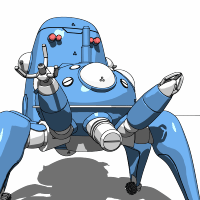December 19, 2007
First off, in case you have not heard a few days ago a deranged man walked into a gym in Sasebo on the 15th of December. He killed two people and injured six before fleeing and later turning the gun on himself. (Note: his name has been made public but I won't use it so as to deny the shooter any posthumous fame.) The crime is somewhat unusual in Japan, but it is also not unheard of either. While gun crime is rare in Japan it does occur, and that in and of itself is noteable as a failure of gun control. The mayor of Nagasaki was murdered back in April (See a news story about that here.) As far asking why these things happen, I have found that it usually tends to be wasted and futile effort, it is impossible to know what motivated a person to murder unles they are alive to be asked or they left a such information behind. Even then the answers given may or may not be truthfull or even coherent.
This crime and similar events of late have led to calls for the already draconian firearms legislation in Japan to be tightened even further. The focus on the means of the crime is to miss the entire point. The how of a crime does not matter to the victim of crime. The criminal must be apprehended, given a fair and impartial trial and punished as the law provides. When as in this case it is not possible to punish the criminal, one conducts a full investigation so as to learn what was done right and what was done wrong and how to better hnadle such incidents in the future.
From the Yomuiri Shimbun: Killings raise doubts over gun permit system
Senior officers at the National Police Agency have been puzzling over how a man who randomly shot two people dead at a sports gym in Sasebo, Nagasaki Prefecture, on Friday evening, was able to obtain a permit to own a hunting gun.This latest incident, after which suspected assailant Masayoshi Magome took his own life, comes after previous fatal shootings with shotguns this year in Kagoshima and Kochi prefectures.
In all these cases, the suspected assailants had been granted permits by prefectural public safety commissions to own such weapons.
This latest incident will inevitably stir debate over whether police forces are making sufficient background checks on those wishing to own guns.
"The permit system has become emasculated and inspections are a mockery," one expert said.
According to the NPA, permits had been granted for about 305,000 hunting weapons such as rifles and shotguns across the country as of the end of June 2006.
Last Sunday, a drunk man used a shotgun to shoot dead a female neighbor and wound a man at the woman's home in Tsunocho, Kochi Prefecture.
In the latest incident in Sasebo, the suspect is believed to have behaved strangely prior to the shooting, doing things such as calling on a neighbor out of the blue in the middle of the night.
A local resident is reported to have asked the prefectural police to revoke Magome's gun permit.
Human nature is largely an unchanging thing, it has exsisted for thousands of years and will far out last all those who are alive today. The purpose of the social contract between citizen and government is simple, that the government will maintain order and protect its citizens from attack by foreign powers and other duties as agreed to by both parties. In return the citizen agrees to obey the laws of the state and to serve the state when needed. But the state also agrees to be bound by the same laws and to respect and protect the rights of its citizens, which pre-exsist the state. Why mention this, simple the difference between gun control in the US and Japan is the understanding of the concept of the social contract and other ideas that spring form the enlightenment and the preceding age of reason.
Japan can, of all the advanced western democracies be viewed as the only pre-enlightenment state. While much of europe has fallen into an equally state centered post enlightenment quagmire of european super goverence even they still show the effects that enlightenment thinking and political theory has had upon them. The concept of the social contract was first articulated by Hobbes in Leviathan named and developed into a complete concept by Jean-Jacques Rousseau and elaborated by Locke, Paine and Descartes. The concept of a social contract between government and citizenry or subject was not one to spring from the minds of eightteenth centurty political thinkers however. Its earliest form is the King of England agreeing to curtail certain of his powers in return for the full support of the nobility of his kingdom in the Magna Carta.
The average American is well aware of the fact that A.) He has certain rights, and that B.) no one, not even the Government can take them away. But most importanly the understand on a gut level that their rights exsisted before the government came into being, exsists while it is in being and will exsist even when the government is no more. To put more simply, rights are inherent to being a human and government acknowledges and respects those pre-exsisting natural and unalienable rights. This understanding of the relationship between Goverment and Governed is important, for it defines how the individual views himself in rleationship to the goverment and in part to society as a whole. The average Japanese citizen is aware that he has rights, but like so many people around the world his understanding is not that those rights exsist wether their is a government or not, but rather that they are granted to them by the government. This inversion turns the entire social contract concept upon which a representative democracy such as Japan is based on onto its ear.
The Japanese historian, Nobutaka Ike, observes in modern Japan a 'preference for paternalism'.[100] An American historian writes: 'Never conquered by or directly confronted with external forms of political rule (except for the MacArthur occupation), they remained unaware of the relative, fallible nature of authority. Authority was a "given", taken for granted as an unalienable part of the natural order'.[101] A Tokyo University historian describes 'an assumption that the state is a prior and self-justifying entity, sufficient in itself. This results in a belief that...the state should take precedence over the goals of other individuals and associations...'.[102]The differing meanings of the phrase 'rule of law' highlight the contrast between American and Japanese views of authority. In America, observes Noriho Urabe, 'rule of law' expresses the subordination of Government to the law. In Japan, the 'rule of law' refers to the people's obligation to obey the Government, and is thus 'an ideology to legitimize domination'.[103]
More than the people of any other democracy, the Japanese accept the authority of their police and trust their government.
While the Constitution of Japan is based upon the same enlightenment concepts as its american counterpart the lack of understanding of the concepts enumerated by the enlightenment means that the nature of goverence and the nature of the interaction between Government and Governed in Japan has changed little since the end of the second world war. The most basic underpining of all in the concept the social contract is that when the state breaches that contract that it loses its legitimacy and authority and the citizens of that state revert back to their naturally free state of being. And if the Governement continues to trample the rights of its citizens it may, no must be, be justly and rightfully overthrown, by force if necessary. The second amendment is not about hunting or self defense, it is about ensuring that if the Government should become tyrannical that the citizenry may exercise their right to dissolve that government. This is not a new concept either, indeed it is the basic underpinning of the Declaration of Independence.
The basic firearms law permits a policeman to search a person's belongings if the officer judges there is 'sufficient suspicion that a person is carrying a fire-arm, a sword or a knife' or if he judges that a person 'is likely to endanger life or body of other persons judging reasonably from his abnormal behavior or any other surrounding circumstances'.[32] Once a weapon is found, the policeman may confiscate it. Even if the confiscation is later admitted to be an error, the firearm is sometimes not returned.[33](p.29)In practice, the special law for weapons searches is not necessary, since the police routinely search at will. They ask suspicious characters to show them what is in their purse or sack.[34] In the rare cases where a policeman's search (for a gun or any other contraband) is ruled illegal, it hardly matters; the Japanese courts permit the use of illegally seized evidence.[35] And legal rules aside, Japanese, both criminals and ordinary citizens, are much the more willing than their American counterparts to consent to searches and to answer questions from the police.[36]
'Home visit is one of the most important duties of officers assigned to police...' explains the Japanese National Police Agency. In twice-a-year visit, officers fill out Residence Information Cards about who lives where and which family member to contact in case of emergency, what relation people in the house have to each other, what kind of work they do, if they work late, and what kind of cars they own.[37] The police also check on all gun licensees, to make sure that no gun has been stolen or misused, that the gun is securely stored, and that the licensees are emotionally stable.[38]
The confession rate is 95 per cent.[47] As a Tokyo police sergeant observes, 'It is no use to protest against power'.[48] Suspects are not allowed to read confessions before they sign them, and suspects commonly complain that their confession was altered after signature. The police use confession as their main investigative technique, and when that fails, they can become frustrated and angry. The Tokyo Bar Association states that the police routinely 'engage in torture or illegal treatment'. The Tokyo Bar is particularly critical of the judiciary for its near-total disinterest in coercion during the confession process. 'Even in cases where suspects claimed to have been tortured and their bodies bore physical traces to back their claims, courts have still accepted their confessions'.[49]
The nature of the limits palced on the citizens of a society is a direct reflection of how the members of that society view the nature of their relationship with their government and what the limits of its powers are and ought to be. The United States has limited gun control for a number of reasons, but not least of which is concept that the power of the government is inherently limited. The Japanese view is the opposite, and as a result a democratic government founded on enlightenment principles is able to, with by and large the acceptence and to some extent the approval of the populace to behave in a manner more commonly associated with dictatorial regiemes. The US is and remains a nation born of the enlightenment, while Japan remains a society that was born of an inward looking feudalism.
The traditions of each society are reflected in their approaches to the same issue. For the Japanese the answer is more government and expropriation of rights and power from the populous, while in the US it is to ensure that those very same rights are respected and in many cases expanded. Until Japanese society fully understands, accepts and internalizes the concepts of governence and rights born by the enlightenment Japan will remain a nation where the government is rgearded as being superior to and largely in control of the population rathr than the inverse the Japanese constitution envisions.
(The quotes used in this posting come from a great article by David B. Koppel, available here.)
Posted by: raging tachikoma at
12:30 AM
| No Comments
| Add Comment
Post contains 2013 words, total size 14 kb.

All content here in is the opinion of the author(s) and does not represent the views of the Department of the Army, the Departmnent of Defense or any other goverment agency or official. Note this site may contain content that is not work safe, you have been warned, but we all know thats why you come here anyway.
Search Thingy

 I Am A Freind of Taiwan, the Free, Democratic China!
I Am A Freind of Taiwan, the Free, Democratic China!
Recent Comments
- free reverse phone lookup verizon Wohh just what I was hunting for, thanks for putting up. entry
- http://homecinemasansfil.net/ Hello, I would like to subscribe for this website to take most recent updates, so where can i do i... entry
- Amy Jie I love Fuuka. These are definitely being incorporated on my porn site. Thanks for the compilat... entry
- Alice en BCN I am actually grateful to the holder of this site who has shared this great paragraph at here. entry
- cronolucca Mother of God.... entry
- custom thesis While not necessarily heavy on thought provoking plot or an examination of some great concept online... entry
- free vlc converter Free VLC Converter is the best program to Convert VLC files with high output quality easily, and thi... entry
- free vlc converter Free VLC Converter is the best program to Convert VLC files with high output quality easily, and thi... entry
- free vlc converter Free VLC Converter is the best program to Convert VLC files with high output quality easily, and thi... entry
- free vlc converter Free VLC Converter is the best program to Convert VLC files with high output quality easily, and thi... entry
Archives
- February 2010 (2)
- March 2009 (4)
- November 2008 (1)
- August 2008 (3)
- June 2008 (1)
- May 2008 (1)
- April 2008 (1)
- March 2008 (1)
- January 2008 (4)
- December 2007 (22)
- November 2007 (16)
- October 2007 (43)
- September 2007 (34)
- August 2007 (40)
- July 2007 (58)
Blogroll
The Castle Argghhh!Ambient Irony
EU Referendum
In From The Cold
Free Market Fairy Tales
Of Arms and the Law
Icarus Publishing Blog
Pat Dollard
The Ten O'Clock Scholar
Chizumatic
Defence of the Realm
Hiesei Democracy
The Huntsman
![]() Warning sites in Yellow are not for minors and are not work safe
Warning sites in Yellow are not for minors and are not work safe
Politics and Pundits
Rush LimbaughMark Steyn
National Rifle Association
Republican Party HQ
Sean Hannity
Dennis Miller
Stop the ACLU
Otaku Links
Roberts Anime Corner StoreViz Media
Dark Horse Publishing
TOKYOPOP
Del Rey Manga
DMP
CMX
Seven Seas
ADV
Funimation
Bandai USA
Media Blasters
The Right Stuff International
Anime News Network
Anime On DVD
Fan Fiction.Net
4Channel
Categories
Anime!Manga!
Behind the Beaded Curtain
Reviews
The War
General Musings
Technical Orders
Books
Movies
TV
Sports
Gaming
Natural Oil
Guns,guns,guns!
News to Use
Fox NewsThe Daily Yomiuri
Japan Times Online
The Drudge Report
The Washington Times
The Wall Street Journal
Michael Yon
Defend America
City Journal
The China Post
Taipei Times
The Chosun Ilbo
The Korea Herald
The Korea Times
Asahi Shimbun
The Bangkok Post
Links of Knowledge
NASAWikipedia
"Having defeated our enemies let us treat them not as the conquered and submited foe but rather as those now freed from opression and privation. Let them be reborn, not as enemies but as allies, friends not foes. We seek to help create a more equitable and just world. We extended now the hand of help and aid having laid aside the might of sword and shield. Let us working together build now a free, just and democratic world, and may history judge that we left the world a better, safer, freer and more prosperous place than we first found. And barring that may posterity record that we tried with all our might to make it so."
Monthly Traffic
- Pages: 17394
- Files: 98
- Bytes: 224.3M
- CPU Time: 38:08
- Queries: 596012
Content
- Posts: 233
- Comments: 57
36 queries taking 0.0317 seconds, 76 records returned.
Powered by Minx 1.1.6c-pink.









